|
|
|
Sort Order |
|
|
|
Items / Page
|
|
|
|
|
|
|
| Srl | Item |
| 1 |
ID:
046611
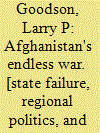

|
|
|
|
|
| Publication |
Seattle, University of Washington Press, 2001.
|
| Description |
xv, 264p.hbk
|
| Standard Number |
0295980508
|
|
|
|
|
|
|
|
|
|
|
|
Copies: C:1/I:0,R:0,Q:0
Circulation
| Accession# | | | | | | | | | | | |
| 045816 | 958.1/GOO 045816 | Main | On Shelf | General | | | | | | | |
|
|
|
|
| 2 |
ID:
131029
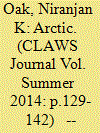

|
|
|
|
|
| Publication |
2014.
|
| Summary/Abstract |
Regionalism as a political project has been a signi?cant phenomenon in post-1945 international relations. The third phase of regional integration began towards the end of the 19805 within the international context created by the end of the Cold War. Academics dubbed it as "new regionalism".' Most of the regional organisations that came up in those days were based on economic cooperation among the states. It was an era of globalisation. The Arctic Council (AC) which emerged in 1996 was a unique case. The 'Arctic' has emerged as a region in international cooperation during the past 20-30 years, as manifest in the creation of the AC. The objective of the AC was sustainable development and environmental protection only, and that is why it may be termed as a unique case in that period.
|
|
|
|
|
|
|
|
|
|
|
|
|
|
|
|
| 3 |
ID:
131848
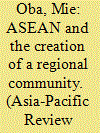

|
|
|
|
|
| Publication |
2014.
|
| Summary/Abstract |
After the ASEAN Concord II called for the building of an ASEAN Community in 2003, the creation of an ASEAN Community became a concrete part of the political agenda for the nations of Southeast Asia, and an ASEAN Community is scheduled to be created in 2015. However, it will all be for naught if the ASEAN Community that is established does not truly contribute to the stability and prosperity of the region. From this point of view, the article will attempt to evaluate the development of an ASEAN community concept and efforts to create it. To clarify the ideal of a true community, this article will take up Karl Deutsch's concept of "pluralistic security communities" and reconsider what a community requires. The article will state that the efforts to create an ASEAN Community should not be underestimated, and the blueprints for the creation of the ASEAN Community outline the formation of a true regional community. It will, however, conclude that in reality there exist factors within the ASEAN region that may shake the development of an ASEAN Community. It has to be said that the fostering of a sense of community at the level of ordinary people, as well as the creation of a community in which fundamental values and norms are shared, are distant propositions.
|
|
|
|
|
|
|
|
|
|
|
|
|
|
|
|
| 4 |
ID:
134134
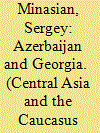

|
|
|
|
|
| Publication |
2014.
|
| Summary/Abstract |
The relations between Georgia and Azerbaijan are a key factor in regional politics and security in the Southern Caucasus. They strongly affect economic contacts and trade, as well as the implementation of all sorts of communication and energy projects. The two countries agree on many issues of regional policy, the way ethnopolitical conflicts should be settled, and the degree to which external actors could or should be involved. Turkey's presence in bilateral Georgian-Azeri relations is another important factor that may end in a geopolitical triangle of sorts in the Southern Caucasus. On the other hand, these relations cannot and should not be described as a formalized full-scale political, let alone, military-political alliance with corresponding mutual obligations. The author discusses these and other aspects of bilateral relations, assesses the prospects for further cooperation, and points to the possible challenges and problems that might crop up later.
|
|
|
|
|
|
|
|
|
|
|
|
|
|
|
|
| 5 |
ID:
126586


|
|
|
|
|
| Publication |
2013.
|
| Summary/Abstract |
Using the 'achievement index', a country's relative size of gross domestic product divided by its relative size of population, I argue that the high-achieving position of the West, as a structural distortion, has been a principal source of instability in the modern international system. Rather than being just unsatisfied great powers, large high achievers and stagnant low achievers engage in hegemonic and counter-hegemonic warfare, respectively. Both hierarchy and balancing systems are structurally more stable if they are 'natural' and less stable if they are 'unnatural', with being natural defined as an achievement index of 1. The rise of the rest constitutes a long-term trend back to nature, beginning to flatten the heretofore skewed international structure, which lessens one source of modern system-level instability. With a much larger share of world population, China cannot rise to the same relative height as the West that rose with a much smaller share of the population. China's rise is thus unlikely to repeat the past experience of the rising West.
|
|
|
|
|
|
|
|
|
|
|
|
|
|
|
|
| 6 |
ID:
027185
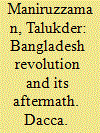

|
|
|
|
|
| Publication |
Dacca, Bangladesh books international ltd., 1980.
|
| Description |
xvi, 259p.hbk
|
|
|
|
|
|
|
|
|
|
|
|
Copies: C:1/I:0,R:0,Q:0
Circulation
| Accession# | | | | | | | | | | | |
| 020561 | 954.9205/MAN 020561 | Main | On Shelf | General | | | | | | | |
|
|
|
|
| 7 |
ID:
127558
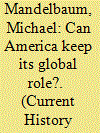

|
|
|
|
|
| Publication |
2014.
|
| Summary/Abstract |
Almost one hundred years ago events took place that propelled the United States on the path to the global role it plays today. World War I drew the country from the edge of international politics to the center. In 1917 America entered the war, dispatching troops to the European continent for the first time in its history. The United States withdrew from the security affairs of the continent during the interwar period, but returned in World War II, playing a larger role in Europe than in the previous conflict while simultaneously waging another major war, against Japan, in the Pacific.
|
|
|
|
|
|
|
|
|
|
|
|
|
|
|
|
| 8 |
ID:
074397
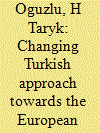

|
|
|
| 9 |
ID:
130416
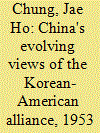

|
|
|
|
|
| Publication |
2014.
|
| Summary/Abstract |
This article reconstructs an ideational trajectory in which China's views of the Korean-American alliance evolved during the last 60 years. The article first surveys China's general policy toward alliance and alliance-making. The article then traces the evolutionary path of Chinese views in the following four periods: (1) the Cold War era (1950s-1960s); (2) transformative years (early 1970s-mid-1990s); (3) the period of a strained alliance (late 1990s-late 2000s); and (4) an era of great reversal (late 2000s-present). Principally, the article suggests that China's view of the Korean-American alliance was intense antagonism during the Cold War era, although it was significantly watered down during the transformative years of Sino-South Korean rapprochement. With the normalization of relations between Beijing and Seoul in 1992 and a decade of progressive rule (1998-2007) in South Korea, China's view encompassed some wishful thinking about a gradually diluted alliance. The strong comeback of the conservatives in South Korean politics since 2008, however, shattered such optimism and re-awoke Beijing to some cold realities. China's view of the Korea-American alliance may grow more negative in tandem with US-China relations, irrespective of the official rhetoric of sovereignty regarding alliance and alliance-making.
|
|
|
|
|
|
|
|
|
|
|
|
|
|
|
|
| 10 |
ID:
130608
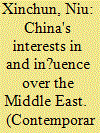

|
|
|
|
|
| Publication |
2014.
|
| Summary/Abstract |
The Middle East became a critical region for China after 1993, when The Beijing became a net oil importer. From this point, it became enmeshed in the complicated regional situation. And so China must realize its basic interests and policy objectives in the Middle East as well as set up an overall, balanced, clear and long-term strategic framework. Policy choices should be made in accordance with such factors as diplomatic tradition, national strength and political ideology
|
|
|
|
|
|
|
|
|
|
|
|
|
|
|
|
| 11 |
ID:
126585
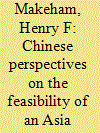

|
|
|
|
|
| Publication |
2013.
|
| Summary/Abstract |
The ongoing worries complicating China's rise are exacerbated by China's perceived double-bind dilemma: China is attacked as a threat to regional stability when it is active in the regional arena and damned as an irresponsible stakeholder when it is not. As an emerging global power China is naturally seeking to secure its ever-increasing interests abroad. Therefore, China's double-bind will intensify as China's foreign policy evolves from 'biding its time and hiding its capacities' to that of an increasingly proactive regional actor. The author argues that, in light of this likely transition in Chinese foreign policy conduct, the time is more pressing than ever before to mitigate anxieties and maximise the chances of China's positive-sum integration within the region. The argument correlates with the proposal by Australian Prime Minister Kevin Rudd in 2008 that the region begin contemplating the realisation of an Asia Pacific community (APc) concept, as a framework to rehabilitate the region's multilateral architectural mélange and implicitly reform the ASEAN Way-driven modus operandi with a more muscular APc Way. Such an outcome may be realised through streamlining the region's institutional alphabet soup and reforming the lacklustre ASEAN Way.
|
|
|
|
|
|
|
|
|
|
|
|
|
|
|
|
| 12 |
ID:
128395
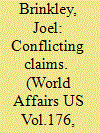

|
|
|
|
|
| Publication |
2014.
|
| Summary/Abstract |
Most everyone has heard of the South China Sea debate, the enduring argument between China and most every other state that has a coastline on that waterway. From Indonesia to the Philippines, every state is angry with China over its claim that it maintains full ownership rights to nearly all of the sea's islands and resources.
|
|
|
|
|
|
|
|
|
|
|
|
|
|
|
|
| 13 |
ID:
131062
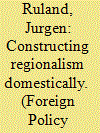

|
|
|
|
|
| Publication |
2014.
|
| Summary/Abstract |
There is a dearth of studies exploring the construction of ideas on regionalism outside Europe. This article seeks to make a contribution to close this gap. It examines the construction of ideas on regionalism in Indonesia, the largest member country of the Association of Southeast Asian Nations (ASEAN). Theoretically, the paper draws from Acharya's concept of "constitutive localization" which it develops further. It offers an alternative explanation to studies which argue that as a result of mimetic behavior, social learning, and cost-benefit calculations, regional organizations across the world become increasingly similar. While this may be the case in terms of rhetoric and organizational structure, it is not necessarily the case at a normative level. The Indonesian case shows that even though foreign policy stakeholders have increasingly championed European ideas of regional integration after the Asian Financial Crisis of 1997/1998, they have skillfully amalgamated them with older local worldviews through framing, grafting, and pruning. European ideas of regional integration thereby served to modernize and relegitimize a foreign policy agenda which seeks to establish Indonesia as a regional leader with ambitions to play a major role in global politics.
|
|
|
|
|
|
|
|
|
|
|
|
|
|
|
|
| 14 |
ID:
122829
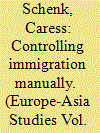

|
|
|
|
|
| Publication |
2013.
|
| Summary/Abstract |
In 2007, the Russian government instituted quotas for immigrant work permits that were consistently lower than actual labour demand. While low quotas are politically popular on the mass level, this article argues that low quotas are also a tool of the government to distribute patronage resources to regional political and economic elites. For several years after quotas were instituted, they remained quite controversial, and during this time decisions about them were firmly in the hands of Vladimir Putin, first as president and then as prime minister, giving him a powerful tool to control the immigration process and labour market manually. While this type of manual control is effective in the short term to manage contentious policy arenas, it suffers a number of possible long-term consequences.
|
|
|
|
|
|
|
|
|
|
|
|
|
|
|
|
| 15 |
ID:
131018
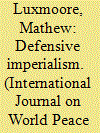

|
|
|
|
|
| Publication |
2014.
|
| Summary/Abstract |
This article examines Russia's approach to the post-Soviet space in relation to domestic stability during
I'utin's first two terms. It identi?es three dimensions of security which underpinned foreign policy during
this period-ideological, economic, and mi1itary~and demonstrates how each interacted with policies on the domestic front. Assessing Rnssia's response to Ukraine's Orange Revolution, it shows how the events of 2004 initiated a shift towards insulation from perceived external threats to political stability. A policy of "defensive imperialism" emerged whereby offensive actions abroad were aimed fundamentally at facilitating a stable external environment to politically safeguard the regime. The article concludes with a brief assessment of developments since 2008, and offers a pessimistic prognosis of the impact this trend will have on Russia's domestic stability and its international relations.
|
|
|
|
|
|
|
|
|
|
|
|
|
|
|
|
| 16 |
ID:
131386
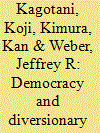

|
|
|
|
|
| Publication |
2014.
|
| Summary/Abstract |
Since its democratization, South Korea's foreign relations with Japan have become increasingly volatile. We investigate the diversionary incentives behind these fluctuations in South Korean foreign policy during 1988-2011. We show evidence that, similar to mature democracies, economic turmoil is driving Korean leaders to divert the public attention toward low-intensity disputes against Japan. However, unlike mature democracies, our results reveal that public approval ratings and national elections do not encourage leaders to engage in the diversionary behavior due to South Korean domestic political institutional settings and party system. These findings highlight challenges to foreign policy making in a new democracy, an issue that has not been considered in detail in the literature. We conclude that although historical antagonism and US commitment to East Asia may affect the Japan-South Korea relationship, economic diversionary incentives significantly determine the fluctuations in Japan-South Korea disputes.
|
|
|
|
|
|
|
|
|
|
|
|
|
|
|
|
| 17 |
ID:
129795
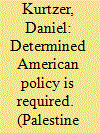

|
|
|
|
|
| Publication |
2014.
|
| Summary/Abstract |
U.S. Secretary of State John Kerry has done an admirable job of creating an "architecture of peace" to support the negotiations launched in July 2013. He engineered the appointment of retired U.S. General John Allen to delve deeply into Israel's security requirements following a peace treaty, recognizing that the security dilemmas would range far beyond the immediate challenges of securing an Israeli-Palestinian border. Kerry understood that Israel's readiness to take the risks associated with withdrawal from the Occupied Palestinian Territories (OPT) would be influenced directly by the degree to which Israel's security requirements were taken into account.
|
|
|
|
|
|
|
|
|
|
|
|
|
|
|
|
| 18 |
ID:
126620


|
|
|
|
|
| Publication |
2013.
|
| Summary/Abstract |
Maritime territorial disputes have become a hot issue in regional security and a pressing issue for Taiwan's national security. While Taiwan is persistently claiming sovereign right over the large part of the South China Sea based on the U-shaped line, its role is however weakened as a result of the cross-strait hostility and its prolonged hands-off policy. Of course, its ambiguous international status, difficult relation with mainland China and domestic political confusion on nation's future have more to do with its inactive role in the South China Sea disputes. This insecurity contributes to its ambivalent policy. This articleintends to address Taiwan's legitimate claim for the part of the South China Sea, which has been unknown and neglected by the international community, and examine the reasons why Taiwan had taken inactive policy toward the South China Sea. Alerted by recent aggressive moves of other claimants, Taiwan is now shifting to a reasonable tougher strategy in the South China Sea. The articlealso projects the course of fresh efforts made by the Taiwan government pressurised by the public with increasing awareness of urgency.
|
|
|
|
|
|
|
|
|
|
|
|
|
|
|
|
| 19 |
ID:
137568


|
|
|
|
|
| Summary/Abstract |
In 1992, the Nobel Committee awarded its Peace Prize to Rigoberta Menchú Tum, the daughter of poor Guatemalan peasants, for her work promoting indigenous rights. Her prize, momentous in its own right, highlighted a sea change in Latin American politics. Throughout the 1980s and early 1990s, prominent indigenous movements had emerged in countries such as Bolivia, Ecuador, Guatemala, and Mexico. As a result, Latin American countries undertook unprecedented reforms to address ethnic diversity: politicians amended national constitutions to recognize indigenous people, passed laws supporting bicultural education and affirmative action, and added questions about race and ethnicity to official censuses.
|
|
|
|
|
|
|
|
|
|
|
|
|
|
|
|
| 20 |
ID:
131391


|
|
|
|
|
| Publication |
2014.
|
| Summary/Abstract |
East Asia now occupies a prominent place in the study of international relations (IR). This, of course, does not mean that IR scholarship in the past failed to pay due attention to East Asia. Wars, trade, and international integration in this region have been the subject of analysis in countless books and scholarly articles. However, the renewed interest in this region is not so much empirically driven (to increase East Asian coverage in the literature) as before but rather represents a theoretical inquiry pertinent to the intellectual underpinning of the scholarship itself. Today, some experts of the region harshly criticize the 'euro-centric' bias of existing IR study and seek to provide alternative conceptions based on the East Asian experience.1 In response, other scholars have advanced views less provocative but more nuanced about the originality of East Asia. And, there are still others who flatly reject the connotation that the logic of East Asian international relations is inherently different from that elsewhere. Thus, a diverse set of perspectives has been laid out on the table, but their strengths and shortcomings are yet to be evaluated systematically.
|
|
|
|
|
|
|
|
|
|
|
|
|
|
|
|
|
|
|
|
|